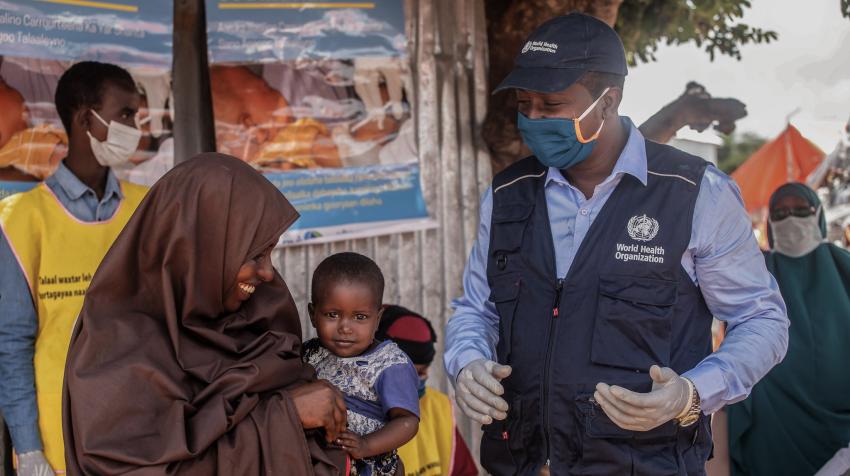In 2020, the COVID-19 outbreak was declared a public health emergency by the WHO in January and characterized as a global pandemic in March. The United Nations launched a comprehensive response to the unprecedented public health, humanitarian and development emergency.
The global guardian of public health
The United Nations, since its inception, has been actively involved in promoting and protecting health worldwide. Leading that effort within the UN system is the World Health Organization (WHO), whose constitution came into force on 7 April 1948 - a date we now celebrate every year as World Health Day.
At the outset, it was decided that WHO’s top priorities would be malaria, women’s and children’s health, tuberculosis, venereal disease, nutrition and environmental pollution. Many of those remain on WHO’s agenda today, in addition to such relatively new diseases as HIV/AIDS, diabetes, cancer and emerging diseases such as SARS (Severe Acute Respiratory Syndrome), Ebola and Zika virus. WHO is spearheading the international response to the Coronavirus disease (COVID-19) pandemic.
In 1948, WHO took the responsibility for the International Classification of Diseases, which has become the international standard for defining and reporting diseases and health conditions. Since its creation WHO has contributed to many historic achievements in global public health. Some of them are:
- Antibiotics: (1950) The great era of discovery of present-day antibiotics begins, and WHO begins advising countries on their responsible use.
- Polio: (1988) The Global Polio Eradication Initiative 1988 is established at a time when polio paralyzed more than 350,000 people a year. Since then, polio cases have decreased by more than 99 per cent because of immunization against the disease worldwide.
- Smallpox: (1979) Following an ambitious 12-year global vaccination campaign led by WHO, smallpox is eradicated.
- Tuberculosis: (1995) The strategy for reducing the toll of tuberculosis (TB) is launched. At the end of 2013, more than 37 million lives had been saved through TB diagnosis and treatment under this strategy.
- AIDS, Tuberculosis and Malaria: (2001) The Global Fund to fight AIDS, Tuberculosis and Malaria, a new partnership and funding mechanism initially hosted by WHO, is created in collaboration with other UN agencies and major donors.
- Children's mortality: (2006) The number of children who die before their fifth birthday declines below 10 million for the first time in recent history.
- Heart Disease, diabetes, cancer: (2012) For the first time WHO Member States set global targets to prevent and control heart disease, diabetes, cancer, chronic lung disease and other noncommunicable diseases.
- Ebola virus outbreak: (2014) The biggest outbreak of Ebola virus disease ever experienced in the world strikes West Africa. The WHO Secretariat activates an unprecedented response to the outbreak, deploying thousands of experts and medical equipment; mobilizing foreign medical teams and coordinating creation of mobile laboratories and treatment centres. In 2016 WHO announces zero cases of Ebola in West Africa, but warns that flare-ups of the disease are likely to continue and that countries in the region need to remain vigilant and prepared.
WHO staff, who include medical doctors, public health specialists, scientists and epidemiologists and other experts are at work on the ground in 149 countries worldwide. They advise ministries of health on technical issues and provide assistance on prevention, treatment and care services throughout the health sector.
WHO interventions cover all areas of the global healthcare spectrum. For instance, WHO intervenes during crises and responds to humanitarian emergencies. It also works to establish International Health Regulations, which countries must follow to identify disease outbreaks and to stop them from spreading. Furthermore, WHO’s work helps to prevent chronic diseases and to achieve the health-related Sustainable Development Goals.
World Health Statistics: Monitoring health for the SDG’s
While the Millennium Development Goals focused on a narrow set of disease-specific health targets for 2015, the Sustainable Development Goals look to 2030 and are far broader in scope. For example, the SDGs include a broad health goal, “Ensure healthy lives and promote well-being for all at all ages”, and call for achieving universal health coverage.
World Health Statistics 2020, WHO’s annual snapshot of the world’s health, states that:
- The world population is not only living longer but living healthier. Life expectancy and healthy life expectancy (HALE) have both increased by over 8% globally between 2000 and 2016, and remain profoundly influenced by income.
- Overall access to essential health services improved from 2000 to 2017, with the strongest increase in low- and lower middle-income countries. Yet, service coverage in low- and middle-income countries remains well below coverage in wealthier ones.
- Compared with the advances against communicable diseases, there has been inadequate progress in preventing and controlling noncommunicable diseases, particularly in low and middle-income countries where delivery of effective NCD interventions remains an overwhelming challenge to health systems.
- Investing in strengthening country health information systems to improve timeliness of data could have the greatest positive impact and is vital for countries to monitor progress towards the SDGs. For almost a fifth of countries, over half of the indicators have no recent primary or direct underlying data.
- Prevention and treatment coverage have substantially improved for major infectious diseases, maternal, neonatal and child health care, leading to steady decline in incidence and mortality from these diseases in the past two decades. However, the current rate of change is insufficient to reach the 2030 SDG targets, and COVID-19 further risks getting the world off track to achieve the SDGs.
Other UN Agencies and Funds involved in health
The WHO is supported by other members of the UN family to promote and protect global health. Many health-related matters are addressed by the General Assembly and the Economic and Social Council, as well as through the efforts of the Joint United Nations Programme on HIV/AIDS (UNAIDS); the work of the United Nations Population Fund (UNFPA) in support of reproductive, adolescent and maternal health; and the health-related activities of the United Nations Children’s Fund (UNICEF).
UN observances related to health
In addition to World Health Day (7 April), annual international observances relating to health, as proclaimed by the General Assembly, include World Water Day (22 March), World Autism Awareness Day (2 April), World No-Tobacco Day (31 May), the International Day against Drug Abuse and Illicit Trafficking (26 June), World Mental Health Day (10 October), World Diabetes Day (14 November) and World AIDS Day (1 December).
Resources
- United Nations COVID-19 Response
- World Health Statistics 2019: Monitoring health for the SDGs
- Healthier, fairer, safer: the global health journey 2007–2017


